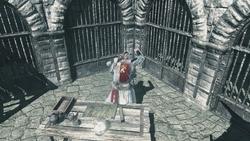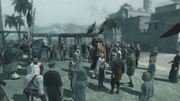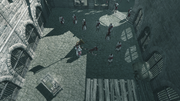- "We'll see how sweet they are, the fruits of your labors. You do not free the cities as you believe, but rather damn them. And in the end, you'll have only yourself to blame. You, who speak of good intentions."
- ―William of Montferrat[src]
William of Montferrat (1136 - 1191) was a Crusader in the army of King Richard I of England and, secretly, a member of the Templar Order.
Following Acre's conquest, Montferrat became the regent of the city, and as a result of Al Mualim's plan to free the Kingdom of conflict, he became the fifth target of the Levantine Assassin Altaïr Ibn-La'Ahad.
Biography
Regent of Acre
- "The city belongs to its people."
- ―William of Montferrat[src]
At some point during his life, William joined the Christian monastic-military order known as the Knights Templar. Despite the Order's public service of protecting pilgrims on the road to the Holy Land, William became involved in the Grand Master Robert de Sable's plot to usurp control of the Holy Land from both the warring Christians and Saracens. To this end, William became involved in Robert's plan to obtain the legendary Apple of Eden.[2]
It was during this time that William, in order to send a message to the enemies of the Templars, authorized the execution of 3,000 Saracen prisoners whom King Richard had planned to ransom. However, William was publicly denounced by the King of England, and the relationship between the two fractured.[1]
Eventually, his membership in Robert's scheme became known to the Assassins of Masyaf – sworn enemies of the Knights Templar – and so he was chosen to be eliminated. On the orders of Al Mualim, Altaïr Ibn-La'Ahad arrived in Acre to begin his investigation into William's life, and he soon discovered that William was withholding food and money from the citizens. Accompanying this, the Assassin also learned of the ever-growing divide between Richard I and his regent.
Altaïr later made his way to the front of the King's citadel, where he witnessed Richard and William arguing publicly. During this conversation, William expressed his fear that the King had judged him too quickly, and that he did not trust him enough. Outraged by this, King Richard responded that he had left William as Acre's regent, an honor which should not have been underestimated. With this, William attempted to apologize, but Richard left in a fit of rage.
Angered in turn by the shame of being publicly reprimanded, William returned to the citadel, where he took his temper out on his men. In a corner of the keep, William began to harshly insult his soldiers, intending to forcefully motivate them towards a better performance and a stronger sense of duty. To bring across his point, he had two of his men punished for their laziness and dereliction of duty.[2]
Death

Altaïr assassinating William
Altaïr, who had followed William into the fortress, silently and skillfully eliminated the archers around the fortifications' perimeter. When William concluded his latest lecture, his forces left, and he began to look through his papers. It was during this time that Altaïr leapt down and assassinated William with his Hidden Blade.[3]
With his dying words, William told Altaïr that he had not been stealing resources from the citizens, but was simply stockpiling them to be distributed fairly in times of hardship. Altaïr remarked that he knew William intended to give the city to his son Conrad – a remark that William caustically denied – before being informed by William that he felt the city did not belong to anyone, but its people.
Before Altaïr could ask any more questions, William perished, and the Assassin made his escape from the fortress.[2]
Personality and characteristics
Although not a giant of a man, William of Montferrat was nevertheless set in the belief that might makes right, and he spent countless hours training and berating his men, to prepare them for the "coming war." Oddly enough, few of his soldiers had actually joined King Richard's march to the Arsuf plains, leading people to wonder about what "war" he spoke about.
As a strict taskmaster and disciplinarian,[1] William constantly demanded perfection from his men, and was both quick to point out flaws and reluctant to give praise. He was often witnessed shouting, and rarely seemed happy. Later, when two of his soldiers were caught whoring and drinking while on duty, he killed them as an example for the rest of his men.[3]
Trivia
- The choice of William as a target for Altaïr was presumably inspired by the fact that, historically, his son Conrad was murdered by the Hashshashin in Tyre. In reality, William was an elderly man during the events of the Third Crusade.
- Historically, William was actually the fifth named of Montferrat, so he was known as "William the Old" to differentiate him from his eldest son.
- A glitch could occur in Assassin's Creed if William pursued Altaïr to the upper walls of citadel. From there, it would be possible to climb on top of the battlements and push him off into the sea below. A message would then announce the failure of the mission, since the target had "escaped."
- Assassin's Creed producer Jade Raymond revealed that they had originally planned to have Conrad of Montferrat in the game. Their research indicated that he wasn't killed in 1191, but William, Conrad's father, was located in Acre in the same period. In order to maintain the historical accuracy of the project, William was inserted into the game instead.
Gallery
References




